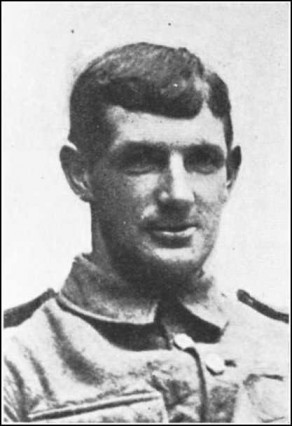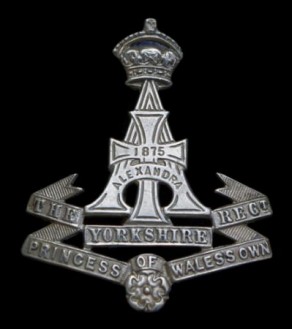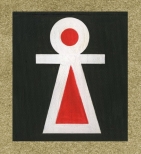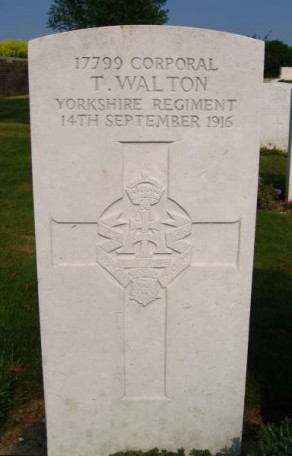29 September 1916
WALTON – September 14th, 1916, killed in action in France, Corporal Tom Walton, Yorkshire Regiment, of Hawes.
29 September 1916
HAWES FOOTBALLER KILLED IN ACTION – CORPORAL TOM WALTON
News was received at Hawes last Friday that Corporal Tom Walton, Yorkshire Regiment, had been killed in action on the 14th. The officer in command of Corporal Walton’s Battalion, in a letter to Mrs. Walton, conveying the sad news, stated that Walton was killed by a shell, death being instantaneous.
Tom Walton enlisted in December, 1914, and was the first married man from Hawes to join the Colours. He was sent out to Egypt last year but was transferred to France some months ago. He was a capital footballer and rendered yeoman service as goalkeeper for the Hawes football club for many years. He was well known amongst footballers throughout Westmorland and Allertonshire, having played in both leagues. He was also a member of the Hawes Conservative Club billiard team that were so successful in the Orde-Powlett Cup Competition. He was a member and office secretary of the Hawes Brass Band. He always showed those qualities in sport that go to make the gallant and effective soldier, and was a sportsman through and through. His cheerfulness and good heartedness won him a host of friends who will sincerely regret his death. He married the second daughter of the late Mr. James Fawcett, Hawes, and leaves a widow and four children.
03 November 1916
HAWES – IMPRESSIVE MEMORIAL SERVICE
A very impressive memorial service for the soldiers from the parish, and those closely connected with the parish, who have fallen in the War, was held in St. Margaret’s Church on Sunday afternoon. From the Church tower the flag of St. George was flying half-mast, and the solemn tolling of the Church bell, announcing the hour of service, deepened the solemnity of the occasion. There was a large congregation, among whom were the relatives of many who have fallen. The service was conducted by the vicar (Rev. S. D. Crawford), and the hymns were 'Lead, Kindly Light’, ‘On the Resurrection Morning’, and ‘For all the Saints’. The soldiers whose memories were honoured were: Frederick Cockett, Albert Leach, Thomas Walton, J. W. Fryer, Reginald Milburn, James Banks, J. Chaytor Metcalfe, George Bargh, and James H. Milner
The Vicar took for his text the words, ‘Greater love hath no man than this, that a man lay down his life for his friends’. He said “As we think of those who have laid down their lives for their country in this War, two thoughts force themselves upon us – the greatness they have achieved, and the atonement they have wrought. Lads who have never trained for war have, in a few months, become the equals of the most magnificently trained army in the world, and we have lived to see a greatness in our splendid boys of which we have but little conception. These lads had acquired a deathless fame; a greatness which would survive as long the British Empire lasts. And some share of this greatness belongs to those for whose lives and deaths we thank God today, and we believe that as they gave their lives without a murmur, so our God will hear the prayers we offer that their souls may rest in peace, and light eternal shine upon them. When we recall the horrors that Belgium, France and Serbia have suffered, and realise that but for those same brave lads we might be suffering the same, we cannot honour them too much, we cannot be too grateful for their devotion and self-sacrifice. To those who mourn their loss, this comfort must come: that their loved ones have passed into the company of heroes who equated not their lives too dear, but at the call of duty sacrificed all for the sake of their country, the good of mankind, and the cause of true liberty. But their death has done more than prove their greatness; it has been an act of atonement, atonement for their country and atonement for themselves.”
There was a time in the history of most nations when it had to be brought back to its allegiance to God by some sharp punishment. We went into this war with clean hands, but nevertheless it was proving a means of national purging. While we as a whole suffered in various ways, the sacrificial shedding of their blood had been the great work of our fallen heroes. “To that sacrifice those we remember today have shared and may we not confidently say that their deaths are a contribution to the cleansing of the nation?”
At the close of the sermon ‘The Last Post’ was sounded on the cornet by Mr. J. Blades, and after the Blessing the Dead March was played on the organ by Mr. F. Haverfield.
29 December 1916
HAWES – A Quiet Christmas
The Christmas of 1916 was the quietest experienced in living history, and many causes contributed to this end. The weather, which was cold, with alternate showers of snow and rain, did not make for cheerfulness and the day was spent for the most part either at home, or (in the case of the men folk), in the clubs. No parties of Christmas singers were abroad on Christmas Eve, or on Saturday night, and no band enlivened matters on Christmas Day. The usual services were held in St. Margaret’s Church, and these were fairly well attended, about 60 partaking of Holy Communion. It was Christmas under war conditions, and which have touched almost every home. Many well-known men have made the great sacrifice. On the Hawes roll of honour are recorded the following names of those fallen in battle:–2nd Lieut. G. Bargh, Pte. James Banks, Pte. Fred Cockett, 2nd Lieut. J.W. Fryer, Pte. John Fawcett, Gunner Albert Leach, Major J.C. Metcalfe, Pte. R. Milburn, Pte. S.Moore, Pte. L. Staveley, and Corporal Tom Walton.









No comments yet.